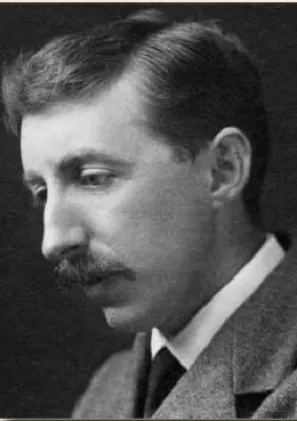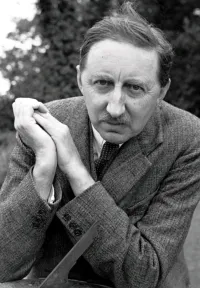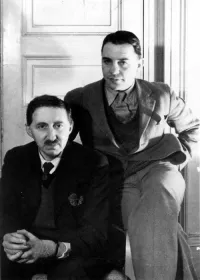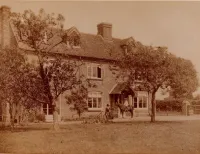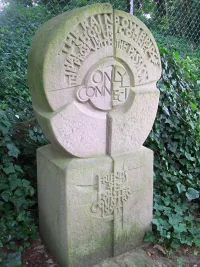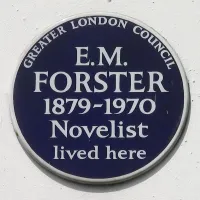Biography
1879 - 1970
“Tolerance is a very dull virtue. It is boring. Unlike love, it has always had a bad press. It is negative. It merely means putting up with people, being able to stand things.”
– E.M. Forster
Upon leaving Cambridge, Edward Morgan Forster decided to devote his life to writing. He soared to literary prominence with the novels: Where Angels Fear to Tread (1905), The Longest Journey (1907), A Room with a View (1908), and Howard’s End (1910); followed by the short story collection, The Celestial Omnibus and Other Stories (1911). He began his masterpiece, A Passage to India, when he first traveled there in 1912, and completed it after a second trip in 1924. A keen observer of the deficiencies of middle class values, class conflict, and the gap between freedom of the spirit and societal convention – Forster’s core theme became the reluctance of people to destroy the barriers of prejudice which rise to divide them. As a conscientious objector during WWI, Forster served in the International Red Cross in Egypt. Later he wrote the travel books Alexandria: A History and a Guide (1922) and Pharos and Pharillon (1923). In 1927 he published the important critical work Aspects of The Novel. This was followed by the short story collection The Eternal Moment in 1928 and the essay collections Abinger Harvest (1936) and Two Cheers for Democracy (1951). In 1946 he became an honorary fellow of King’s College, Cambridge and remained there until his death at the age of 91 in 1970. Forster chose to have his “gay novel” – the love story Maurice, which he wrote in 1913 while staying at Edward Carpenter’s Millthorpe literary retreat – published after his death. In the novel’s Foreword Forster describes his own struggles with being gay.
1879 - 1970
“Tolerance is a very dull virtue. It is boring. Unlike love, it has always had a bad press. It is negative. It merely means putting up with people, being able to stand things.”
– E.M. Forster
Upon leaving Cambridge, Edward Morgan Forster decided to devote his life to writing. He soared to literary prominence with the novels: Where Angels Fear to Tread (1905), The Longest Journey (1907), A Room with a View (1908), and Howard’s End (1910); followed by the short story collection, The Celestial Omnibus and Other Stories (1911). He began his masterpiece, A Passage to India, when he first traveled there in 1912, and completed it after a second trip in 1924. A keen observer of the deficiencies of middle class values, class conflict, and the gap between freedom of the spirit and societal convention – Forster’s core theme became the reluctance of people to destroy the barriers of prejudice which rise to divide them. As a conscientious objector during WWI, Forster served in the International Red Cross in Egypt. Later he wrote the travel books Alexandria: A History and a Guide (1922) and Pharos and Pharillon (1923). In 1927 he published the important critical work Aspects of The Novel. This was followed by the short story collection The Eternal Moment in 1928 and the essay collections Abinger Harvest (1936) and Two Cheers for Democracy (1951). In 1946 he became an honorary fellow of King’s College, Cambridge and remained there until his death at the age of 91 in 1970. Forster chose to have his “gay novel” – the love story Maurice, which he wrote in 1913 while staying at Edward Carpenter’s Millthorpe literary retreat – published after his death. In the novel’s Foreword Forster describes his own struggles with being gay.
Demography
Demography
Gender Male
Sexual Orientation Gay
Gender Identity Cisgender
Ethnicity Caucasian/White
Nations Affiliated United Kingdom Egypt India
Era/Epoch Interwar Period (1918-1939) Progressive Era (1890-1920)
Field(s) of Contribution
Author
Radio
Commemorations & Honors
Sixteen Time Nobel Prize in Literature Nominee
James Tait Black Memorial Prize in Fiction for A Passage to India (1924)
Awarded the Royal Society of Literature's Benson Medal (1938)
Kings College Cambridge Honorary Fellow (1946)
Companion of Honour Recipient (1953)
Order of Merit Member (1969)
Demography
Gender Male
Sexual Orientation Gay
Gender Identity Cisgender
Ethnicity Caucasian/White
Nations Affiliated United Kingdom Egypt India
Era/Epoch Interwar Period (1918-1939) Progressive Era (1890-1920)
Field(s) of Contribution
Author
Radio
Commemorations & Honors
Sixteen Time Nobel Prize in Literature Nominee
James Tait Black Memorial Prize in Fiction for A Passage to India (1924)
Awarded the Royal Society of Literature's Benson Medal (1938)
Kings College Cambridge Honorary Fellow (1946)
Companion of Honour Recipient (1953)
Order of Merit Member (1969)
Resources
Resources
Moffat, Wendy. A Great Unrecorded History: A New Life of E.M. Forster. New York: Farrar, Straus and Giroux, 2010.
https://en.wikipedia.org/wiki/E._M._Forster
https://www.bl.uk/people/e-m-forster
https://www.theguardian.com/books/2012/feb/17/e-m-forster-my-policeman
Resources
Moffat, Wendy. A Great Unrecorded History: A New Life of E.M. Forster. New York: Farrar, Straus and Giroux, 2010.
https://en.wikipedia.org/wiki/E._M._Forster
https://www.bl.uk/people/e-m-forster
https://www.theguardian.com/books/2012/feb/17/e-m-forster-my-policeman
